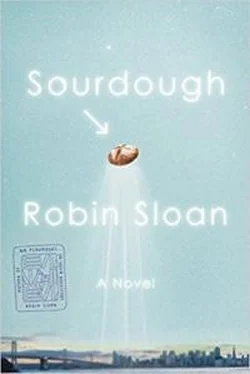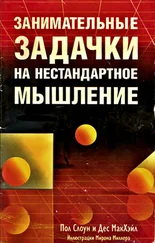General Dexterity’s founder, an astonishingly young man named Andrei, walked our group across Townsend Street to the Task Acquisition Center, a low-slung building that had once been a parking garage. The cement floor was still mottled with oil spots. Now, instead of cars in long lines, there were robot arms parked thirty to a row. Their plastic cladding was colored Dextrous blue, the contours friendly and capable with just the faintest suggestion of biceps—gentle swells marked with General Dexterity’s logo, an affable lightning bolt.
The arms were all going at once, sweeping and grasping and nudging and lifting. If it was supposed to impress us: it worked.
All of these were repetitive gestures, Andrei explained, currently executed by human muscles and human minds. Repetition was the enemy of creativity, he said. Repetition belonged to robots.
We were on a quest to end work.
And it would involve: a shit ton of work.
My orientation week ended on Friday night with celebratory beers and a ping-pong tournament against one of the robot arms, which of course emerged victorious. Then my job began. Not the following Monday. The next morning. Saturday.
I had the feeling of being sucked— floop —into a pneumatic tube.
The programmers at General Dexterity were utterly unlike my colleagues at Crowley, who had been middle-aged and chilled-out, and who enjoyed nothing as much as a patient explanation. The Dextrous were in no way patient. Many of them were college dropouts; they had been in a hurry to get here, and they were in a hurry now to be done, and rich. They were almost entirely young men, bony and cold-eyed, wraiths in Japanese denim and limited-edition sneakers. They started late in the morning, then worked past midnight. They slept at the office.
I hated the idea of it, but some nights I, too, succumbed to the cushy couches upholstered in Dextrous blue. Some nights, I’d lie there, staring up at the ceiling—the exposed ductwork, the rainbow braids of fiber channel ferrying data around the office—and feel a knot in my stomach that wouldn’t loosen. I would think I had to poop and I would go squat on a toilet, doing nothing. The motion sensor would time out and the lights would click off, leaving me in darkness. Sometimes I would sit like that for a while. Then a line of code would occur to me, and I would limp back to my desk to tap it out.
At Crowley Control Systems in Southfield, the message we received from Clark Crowley, delivered in an amble around the office every month or so, was: Keep up the fine work, folks! At General Dexterity in San Francisco, the message we received from Andrei, delivered in a quantitative business update every Tuesday and Thursday, was: We are on a mission to remake the conditions of human labor, so push harder, all of you.
I began to wonder if, in fact, I knew how to push hard. In Michigan, my colleagues all had families and extremely serious hobbies. Here, the wraiths were stripped bare: human-shaped generators of CAD and code. I tried to emulate them, but something hitched inside me. I couldn’t get my turbine spinning.
In the months that followed, I had the sense of some vital resource dwindling, and I tried to ignore it. My colleagues had been toiling at this pace for three years without a pause, and I was already flagging after a single San Francisco summer? I was supposed to be one of the bright new additions, the fresh-faced ones.
My face was not fresh.
My hair had gone flat and thin.
My stomach hurt.
In my apartment on Cabrillo Street, I existed mostly in a state of catatonic recovery, brain flaccid, cells gasping. My parents were far away, locked in the frame of a video chat window. I didn’t have any friends in San Francisco aside from a handful of Dextrous, but they were just as traumatized as I was. My apartment was small and dark, and I paid too much for it, and the internet was slow.
* * *
TWELVE MINUTES after I had called it in, my order from Clement Street Soup and Sourdough arrived, carried to my door by a young man with a sweet face half hidden inside a ketchup-colored motorcycle helmet. A soft oonce-oonce of music emanated from within the helmet, and he bobbed to the beat.
He boomed his greeting in a heavy, hard-to-place accent: “Good evening, my friend!”
Greatest among us are those who can deploy “my friend” to total strangers in a way that is not hollow, but somehow real and deeply felt; those who can make you, within seconds of first contact, believe it.
I dug in my pocket for cash, and then, as I paid him, I thought to ask, “What kind of food is this?”
His face lit up like a neon sign. “It is the food of the Mazg! I hope you like it. If not, call again. My brother will make it better next time.” He jogged toward his motorcycle but, halfway there, turned back to say, “You will like it, though.” Above the rev of the engine he waved and repeated: “You will like it!”
Inside my apartment, on my kitchen countertop—utterly bare, free from any sign of food preparation or, really, human habitation—I unwrapped the sandwich and opened the soup and consumed the first combo (double spicy) of my life.
If Vietnamese pho’s healing powers, physical and psychic, make traditional chicken noodle soup seem like dishwater—and they do—then this spicy soup, in turn, dishwatered pho. It was an elixir. The sandwich was spicier still, thin-sliced vegetables slathered with a fluorescent red sauce, the burn buffered by thick slabs of bread artfully toasted.
First my stomach unclenched, and then my brain. I let loose a long sigh that transformed into a rippling burp, which made me laugh out loud, alone, in my kitchen.
I lifted the lone magnet on my refrigerator, allowed a sheet of shiny pizza coupons to fall to the floor, and stuck the new menu reverently in its place.
* * *
I CALLED CLEMENT STREET SOUP AND SOURDOUGH again the next night, and the next. Then I skipped a night, feeling self-conscious, but I ordered again the night after that. For all its spiciness, the food sat perfectly in my traumatized stomach.
In the month that followed, I learned about it bit by bit:
• The restaurant was operated by two brothers.
• Beoreg, with the sweet voice and the perfect English, answered the phone and cooked the food.
• Chaiman, with the sweet face and the earbuds never not leaking dance music, rode the motorcycle and delivered the food.
• When pressed for more information on “the food of the Mazg,” Chaiman would only laugh and say, “It’s famous!”
• Beoreg and Chaiman had been slinging spicy soups and/or sandwiches in San Francisco for just over a year.
• They possessed no storefront: they cooked where they lived, in an apartment whose precise location they were reluctant to disclose.
• Chaiman said, “It is okay. Just not legal. Definitely okay, though.”
• With the double spicy, one bonus slab of sourdough bread was included, always, for dunking in your soup.
• That bread was the secret of the whole operation. Beoreg baked it himself every day.
• That bread was life.
Most nights, I called ahead and waited on hold (though I was recognized, and the greeting from brother Beoreg was not “Okay to hold?” but “Lois! Hi! I have to put you on hold. Just a second, I promise”) with the music in another language I’d grown to appreciate—it was sad, in a nice way—and then, rescued from purgatory, I placed my order (the same order every time), and when brother Chaiman brought it on his motorcycle, I greeted him warmly and tipped him generously, then carried my double spicy inside to eat it standing, my eyes watering from the heat and the happiness.
One Friday, after a particularly shattering day at the office, in which my code reviews had all come back red with snotty comments, and my manager, Peter, had gently inquired about the pace of my refactoring (“perhaps not sufficiently turbocharged”), I arrived home in a swirl of angst, with petulance and self-recrimination locked in ritual combat to determine which would ruin my night. On the phone with Beoreg, I ordered my food with a rattling sigh, and when his brother arrived at my door, he carried something different: a more compact tub containing a fiery red broth and not one but two slabs of bread for dipping. “Secret spicy,” he whispered. The soup was so hot it burned the frustration out of me, and I went to bed feeling like a fresh plate, scalded and scraped clean.
Читать дальше










